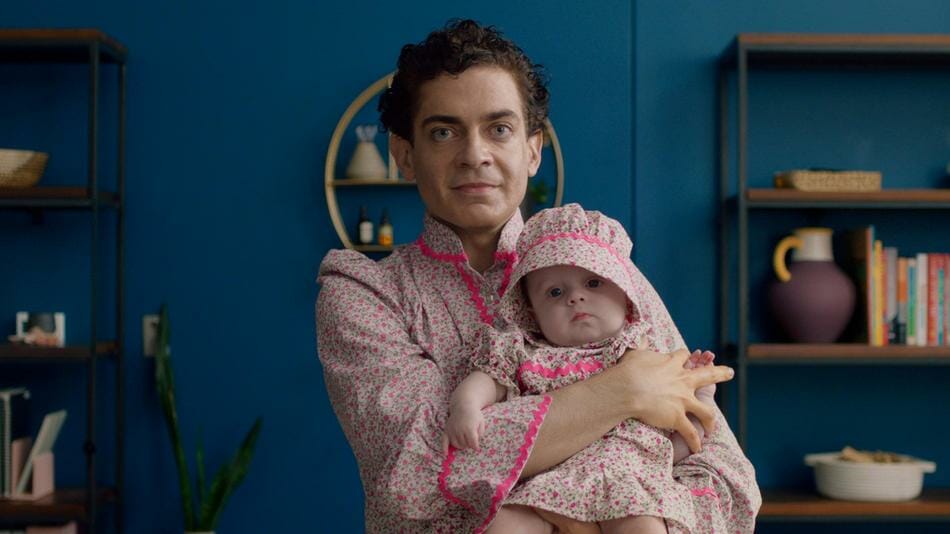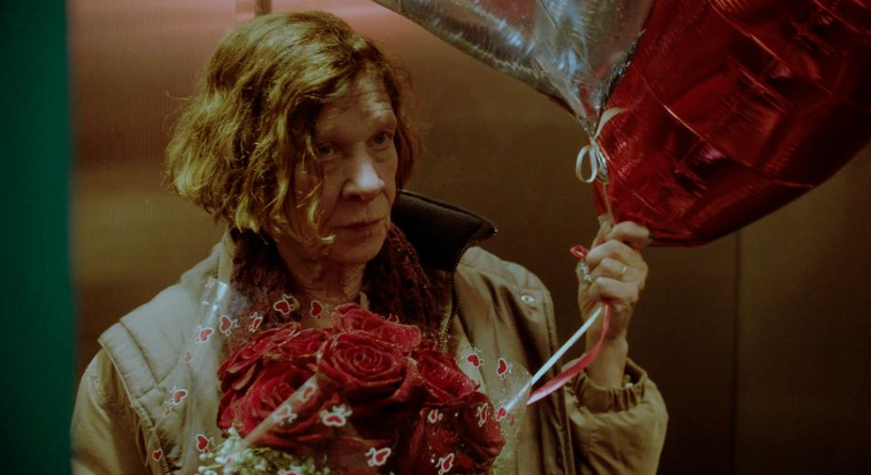This year’s first program of Chicago Critics Film Festival shorts focus on the dark side of family, community & living with mental illness.
The films in the first program of shorts at this year’s Chicago Critics Film Festival all concern those mythic American values of “life, liberty, and the pursuit of happiness.” And they do this in both content and form. Though these films never exceed twenty minutes, they are unbounded examples of the human imagination.
We open on the “happy family” of Nicole Daddona and Adam Wilder’s deliciously unsettling The Mundanes. This surreal nostalgic PSA about the ideal American family is a delightful work of surreal suspense. What begins as a richly designed comment on the facelessness of the perfect family in the white nostalgic imagination soon amps up into an amusing work of comedy horror. Unspeakable delights feed the happiness of the Happy Family. You can bet ambrosia salad won’t be the most unappetizing thing on this 50s-inspired tablescape. The Mundanes serves up a sensational visual style and keen directorial perspective on a silver platter with a healthy helping of disturbing social commentary on the side.
Where The Mundanes merely flavors its offering with an implicit critique of whiteness, Anna Margaret Hollyman’s wry short Wüm makes it the star of the dish. Bennet (Jack Ferver) just wants to be a good parent to their child, so they attend “Wum,” a support group for “mommies.” As Hollyman turns up the intensity, having Bennett be the killjoy who has to tell the women about colonial history and the women not being able to recognize his gender identity, we get a searing portrait of cis white liberal “lean in” womanhood that polices as much as it praises. In this thoughtfully crafted scene study, Anna Margaret Hollyman helps us feel the shrinking isolation that happens when an individual is scanned and othered, especially in supposed “enlightened” company. As the scene settles into a rhythm, building, and building until it explodes all over the carpet, we feel the frustration and hypocrisies of unqueer spaces.

Bennett may be seeking acceptance, but Aaron (Drew Morris) in Jarreau Carrillo’s The Vacation, just wants to get away for a little while. This exceptional short film gets at the heart of what makes Community so great. As Aaron sits in his car, pleading for it to start, he gets interrupted by friends from around the way, each sharing a bit of their lives, dreams, and joints with the frustrated barber. The cabin of his car becomes the whole block, filled with hopes and histories, shared bonds and beliefs. It’s a simple four-door scene, told with heart and a handheld camera. Jarreau Carrillo’s straightforward direction allows the characters and unique performances of his cast to shine through. Humorous and honest, The Vacation is a sketch of life packed with eccentric passengers that uses the magic of short film form to show us something true.
Many of the keen directors featured in this first shorts program use the medium to project light into overshadowed areas of society. The gem tone extravaganza that is Nicole Bazuin’s Thriving: A Dissociated Reverie is a playful and informative introspection about living with Dissociative Identity Disorder (DID). Told with bold honesty, visual imagination, and a knowing sense of humor, Thriving uses cinema’s capability to take us inside the mind and the imagination of someone else to show what is so often only talked about. Actress and co-screenwriter Kitoko Mai graciously invites us into her interior life with the alters who make up the mosaic of her identity to educate us and share her experience. As she explains the realities of having DID, introducing us to each alter, we break through the elements of fantasy and once again arrive at something authentic, a lived experience.
Sam Shainberg’s Endless Sea may not be a documentary, but its verite style creates the experience of watching a moment in real life as it collides with the capitalist system. This profoundly heart-rending work of social realism follows Carol (Brenda Cullterton in a jaw-dropping performance) as she struggles to get the medicine she needs. Faced with an unaffordable copay, we’ll wear out her already ailing heart hustling for tips by delivering Valentine’s Day bouquets and balloons. Shainberg uses quiet visual moments to transform this snapshot of everyday struggle into a work of poetry, Carol’s heart-shaped balloons becoming more ironic as her angina sets in. Yet just when desperation seems insurmountable, we puncture through respectable conventions. And we finally understand what it might take to be alive and free in capitalist America.

Beyond the Fringe by Han Tang is a stop-motion fantasy about a similar freedom. A central figure arises from the blank page of a book. Looking around, it’s unsure of the purpose of its existence. Told with only gesture and movement, we still get a clear sense of our character’s journey from awakening to fear and isolation and through the resolution to live off the page. Much like Carol, this paper spirit makes a bold and inspiring choice. With an astoundingly delicate, fluttering, and flowing animation style, Beyond the Fringe is a profoundly hopeful work of existentialism.
Just like the sentient cutout of Fringe, Maria Luisa in I Have No Tears, And I Must Cry feels bound by paper. This poignantly human story about a woman’s hope for a green card is at once an indictment of the idiotic bureaucracy surrounding immigration but also a profound love story. Joined every step of the way by her husband, Maria Luisa (the magnetic Alejandra Herrera) is subjected to the scrutiny of the system, which silently compounds on her shoulders with every paper shuffle and cross-check. Luis Fernando Puente sits us objectively with the couple, feeling their hope, frustration, anger, and determination. It’s a divinely sensitive story that drops us at the very end of the couple’s process at the critical juncture when the gates of The American Dream should open. Doing so forces us to reconcile our conclusions about injustice in the so-called “greatest country on Earth.”
The first program of shorts concludes with Breaking Silence, a documentary short about Walker Estes, a deaf activist who advocates for deaf people in prison. Instead of presenting a data-driven narrative about the issues of accessibility with the American legal and prison systems, directors Amy Bench and Annie Silverstein allow Walker and his community to communicate for themselves. Their stories point to a spider’s web of impediments within these systems that can trap deaf people. In arguing for accessibility reform, Breaking Silence presents an interesting perspective on the structures that bind us and the ways no one is guaranteed freedom without a fight.
All of the intelligent films in this program use the short genre to tell stories that touch down and then take flight again. Just as they concern characters who are trying their best to be free and pursue happiness, these films are also pushing against conventional form and content. By giving us a close-up on the spirit in a dispiriting world, they each offer critical yet hopeful perspectives on the present.
Read next: The Spool's Best New Releases
Streaming guides
The Best Live TV Streaming Services With Free Trial
The praises of live TV streaming services don’t need to be further sung. By now, we all know that compared to clunky, commitment-heavy cable, live TV is cheaper and much easier to manage. But just in case you’re still on the fence about jumping over to the other side, or if you’re just unhappy with ... The Best Live TV Streaming Services With Free Trial
How to Watch Power Book III: Raising Kanan Season 3
Season 3 of the hotly anticipated Power spin-off, Power Book III: Raising Kanan, is arriving on Starz soon, so you know what that means: it’s the ’90s again in The Southside, and we’re back with the Thomas family as they navigate the ins and outs of the criminal underworld they’re helping build. Mekai Curtis is ... How to Watch Power Book III: Raising Kanan Season 3
How to Watch Doctor Who: 60th Anniversary Specials
Ladies and gentlemen, we’re so back! To celebrate Doctor Who’s 60th anniversary, the BBC is producing a three-episode special starring none other than the Tenth/Fourteenth Doctor himself, David Tennant. And to the supreme delight of fans (that would be me, dear reader), the Doctor will be joined by old-time companion Donna Noble (Catherine Tate) and ... How to Watch Doctor Who: 60th Anniversary Specials
Which Netflix Country has Interstellar?
Maybe you’ve just seen Oppenheimer and have the strongest urge to marathon—or more fun yet, rank!—all of Christopher Nolan’s films. Or maybe you’re one of the few who haven’t seen Interstellar yet. If you are, then you should change that immediately; the dystopian epic is one of Nolan’s best, and with that incredible twist in ... Which Netflix Country has Interstellar?
Which Netflix Country Has Each Movie of The Hunger Games?
For whatever reason, The Hunger Games series isn’t available in the same countries around the world. You’ll find the first and second (aka the best) installments in Hong Kong, for instance, but not the third and fourth. It’s a frustrating dilemma, especially if you don’t even have a single entry in your region, which is ... Which Netflix Country Has Each Movie of The Hunger Games?
How to Watch ESPN With A Free Trial
One of the major concerns people have before cutting the cord is potentially losing access to live sports. But the great thing about live TV streaming services is that you never lose that access. Minus the contracts and complications of cable, these streaming services connect you to a host of live channels, including ESPN. So ... How to Watch ESPN With A Free Trial
How to Watch Paramount Network With a Free Trial
To date, Paramount Network has only two original shows on air right now: Yellowstone and Bar Rescue. The network seems to have its hands full with on-demand streaming service Paramount+, which is constantly stacked with a fresh supply of new shows. But Yellowstone and Bar Rescue are so sturdy and expansive that the network doesn’t ... How to Watch Paramount Network With a Free Trial
How to Watch WE TV With a Free Trial
Previously “Women’s Entertainment,” We TV has since rebranded to accurately reflect its name and be a more inclusive lifestyle channel. It’s home to addictive reality gems like Bold and Bougie, Bridezillas, Marriage Boot Camp, and The Untold Stories of Hip Hop. And when it’s not airing original titles, it has on syndicated shows like 9-1-1, ... How to Watch WE TV With a Free Trial
How to Watch TNT Sports With A Free Trial
For many sports fans, TNT is a non-negotiable. It broadcasts NBA, MLB, NHL, college basketball, and All Elite Wrestling matches. And, as a bonus, it also has reruns of shows like Supernatural, Charmed, and NCIS, as well as films like The Avengers, Dune, and Justice League. But while TNT used to be a cable staple, ... How to Watch TNT Sports With A Free Trial
How to Watch Comedy Central With a Free Trial
It’s no coincidence that many of today’s biggest comedians found their footing on Comedy Central: the channel is a bastion of emerging comic talents. It served as a playground for people like Nathan Fielder (Fielder For You), Ilana Glazer and Abbi Jacobson (Broad City), Tim Robinson (Detroiters), and Dave Chappelle (Chappelle’s Show) before they shot ... How to Watch Comedy Central With a Free Trial
How to Watch FX With a Free Trial
You’d be hard-pressed to find a bad show airing on FX. The channel has made a name for itself as a bastion of high-brow TV, along with HBO and AMC. It’s produced shows like Atlanta, Fargo, The Americans, Archer, and more recently, Shogun. But because it’s owned by Disney, it still airs several blockbusters in ... How to Watch FX With a Free Trial